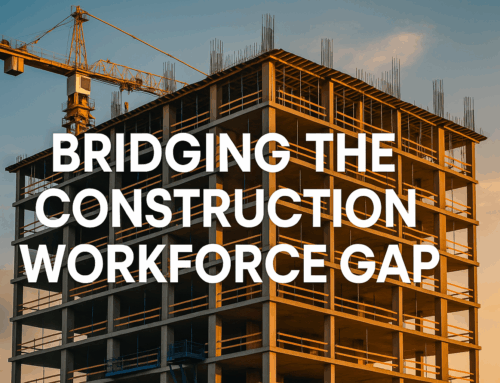As sustainability continues to take center stage in the global arena, it has become an increasingly critical factor shaping the construction industry. Both growing environmental consciousness and stringent regulations are powering this paradigm shift. Sustainability is no longer a choice; it’s a necessity.
According to McKinsey, nearly 40% of global emissions stemmed from the construction industry, underscoring the urgency of adopting greener practices.
Construction companies are quickly recognizing the importance of sustainable practices in minimizing their environmental footprint and securing long-term success. This article explores the key sustainable construction trends, and their benefits, provides actionable advice on adopting them, and spotlights the crucial role specialized construction recruiters play in this green transition.
Reaping the Rewards of Sustainable Trends in Construction
Incorporating sustainability into operations yields several significant benefits, such as long-term cost savings, enhanced reputation, regulatory compliance, and opportunities for innovation. Adopting green technologies, implementing sustainable building practices, and gaining sustainability certifications are some practical steps companies can take to reap these rewards.
As our understanding of environmental issues deepens, stakeholders are advocating for environmentally friendly and socially responsible construction practices. Governments worldwide are supporting this call with regulatory measures and incentives, propelling companies toward sustainable construction practices.
Decoding Sustainability in Construction
At its core, sustainability in construction involves embedding practices that emphasize efficient resource utilization, waste reduction, and environmental impact mitigation throughout a project’s lifecycle. It includes a range of considerations, from employing green building materials and energy-efficient designs to developing waste management strategies, promoting water conservation, and leveraging renewable energy.
By infusing sustainability into every aspect of the construction process, companies can significantly reduce their ecological footprint and contribute to a more sustainable built environment.
Emerging Trends in Sustainable Construction
Several key trends are driving the push toward sustainable construction.
Utilizing green building materials, such as recycled or locally sourced materials, significantly reduces reliance on non-renewable resources and carbon emissions linked to transportation.
Energy-efficient designs incorporating solar panels, intelligent lighting systems, and advanced insulation have become essential, resulting in lower energy consumption and reduced greenhouse gas emissions.
Waste reduction strategies like recycling and reuse have also gained traction, reducing landfill waste and fostering a circular economy within the industry.
The Green Advantage for Construction Companies
Companies that incorporate sustainable practices stand to gain a multitude of benefits. Firstly, sustainable strategies often translate to long-term cost savings, with energy-efficient designs and waste reduction measures reducing operational costs, utility bills, and material waste. Additionally, companies with a strong sustainability ethos can attract environmentally-conscious clients and stakeholders, boosting their reputation and market share. Moreover, sustainability compliance is essential to avoid penalties and legal complications as environmental regulations become increasingly stringent.
Adopting Green Trends: A Practical Guide
To seize the potential of sustainability trends, companies can employ several practical strategies.
Investing in sustainable technology is critical, as it facilitates resource efficiency and energy conservation. Utilizing green building practices, such as eco-friendly materials and energy-efficient designs, is paramount for sustainable construction. Earning certifications like LEED (Leadership in Energy and Environmental Design) can demonstrate a company’s commitment to sustainability, giving them a competitive advantage in the marketplace.
The Pivotal Role of Construction Recruiters
Construction recruiters can be instrumental in facilitating a construction company’s transition to sustainable practices. These professionals are adept at identifying and attracting talent experienced in green building and sustainable practices.
By recruiting the right personnel, companies can ensure the effective implementation of sustainable strategies. Construction recruiters can also offer valuable advice on training and development programs to help existing staff adapt to sustainable practices. Their industry insights and assistance in devising a comprehensive sustainability strategy can align companies with market trends and regulations.
Ready to Get Started?
Sustainability trends are reshaping the construction industry, driven by escalating environmental awareness and regulatory shifts. Construction companies that embrace sustainable practices stand to gain a competitive edge through long-term cost savings, an enhanced reputation, and regulatory compliance.
Investments in sustainable technology, adoption of green building practices, and sustainability certifications can expedite this transition. Construction recruiters can provide invaluable assistance in this green journey, guiding talent acquisition, training, and strategic planning to ensure a successful shift toward sustainable construction. As they embrace sustainability, construction companies are not only contributing to a greener future but also solidifying their market positioning in an evolving industry.
To gain more insights on leveraging sustainability trends in the construction industry, click here.






